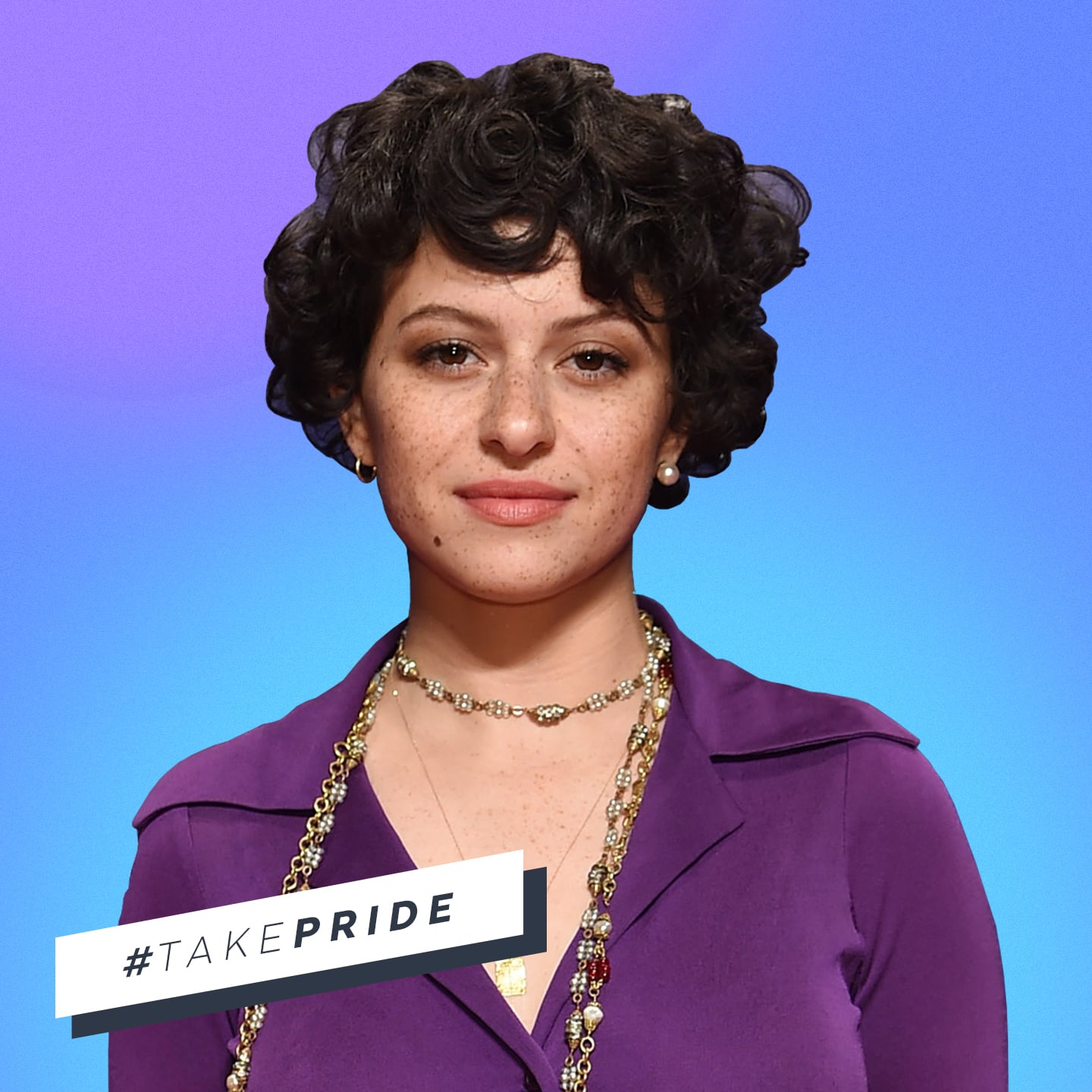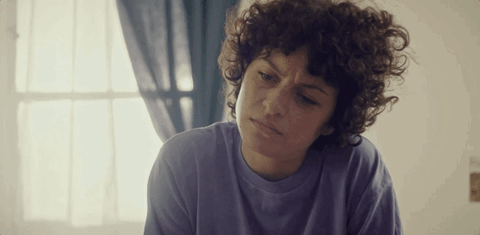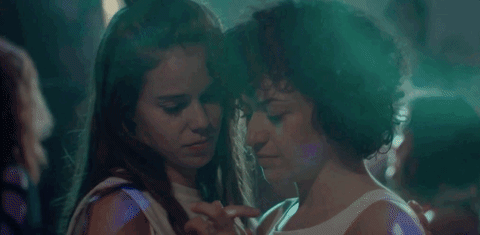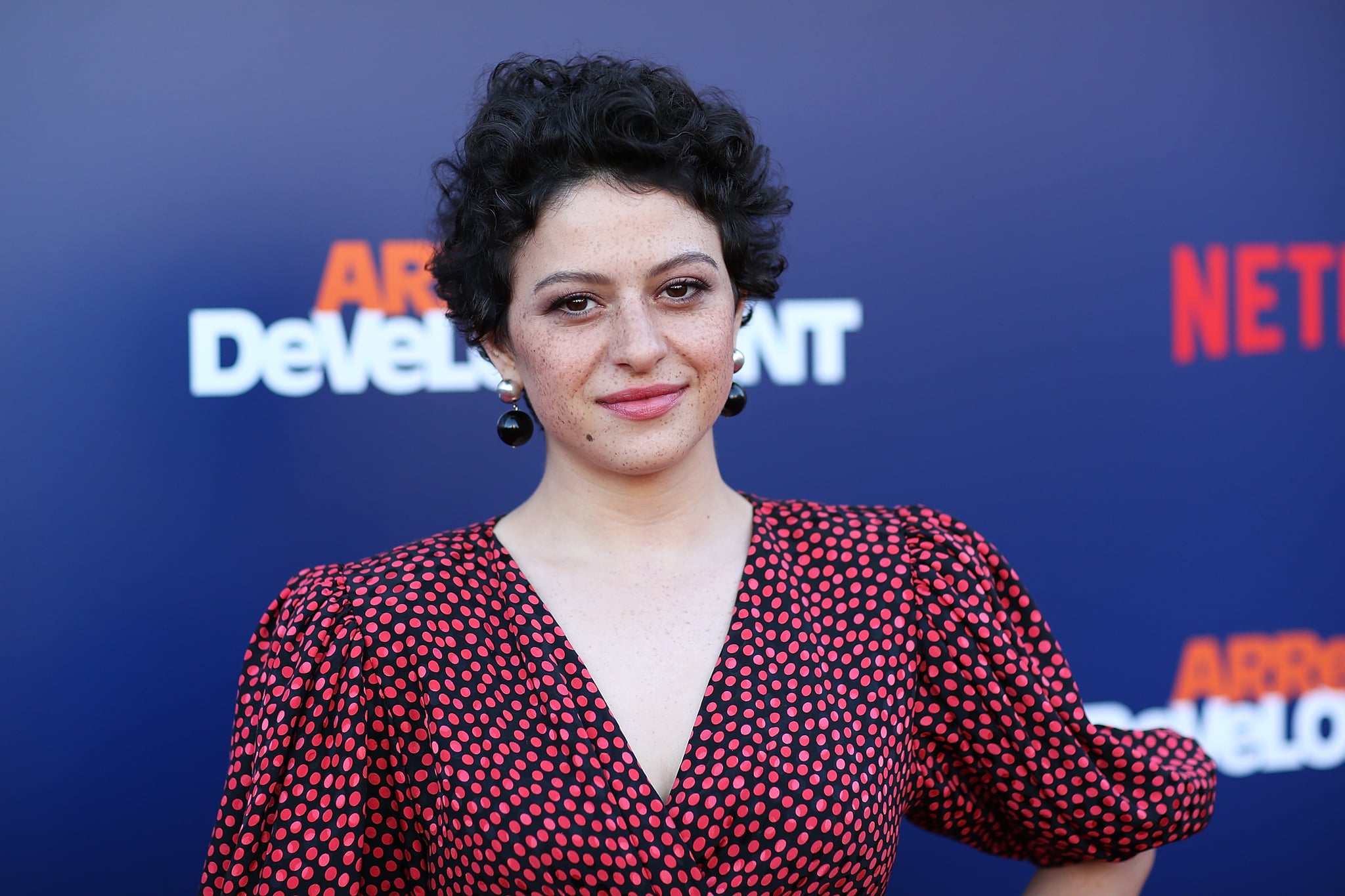
Image Source: Getty / Jamie McCarthy [1]
When it comes to actor Alia Shawkat's sexuality, the past few years have been a revelation. Perhaps not in private; when we spoke on the phone in early June, she told me she's been aware of her own queerness for a long time. "I had always found myself attracted to women, but didn't know how to really make a move, for lack of a better word," she told me with a laugh. But her identity as a bisexual woman has only recently become a part of her career and public persona.
Despite dozens upon dozens of acting credits that stretch nearly 20 years, the queer aspect of Shawkat's art is relatively new. She's best known for playing Maeby Fünke in Arrested Development, Lila on Transparent, and Dory Sief on TBS's critical darling Search Party. Her handful of sexually fluid roles on screen include Dalia in 2013's May in the Summer, Jean in 2014's Wild Canary, Laura in 2015's Me Him Her, and Lola in 2016's The Intervention. She even played Ilana Glazer's look-alike lesbian lover for a single (glorious!) episode of Broad City.
Off the page, Shawkat's visibility as a bisexual woman is even fresher. She didn't officially come out until 2017 — not because she was afraid to, she tells me, but because no one had really asked her directly — when she casually mentioned her bisexuality [2] in an interview with Out Magazine. "Now I consider myself bisexual," she said at the time, "and I think balancing my male and female energies has been a big part of me growing as an actor."
On June 30, Shawkat's new film, Duck Butter, will be available to stream on Netflix. Shawkat wrote, produced, and starred in the film, which seems to be her most brazen venture into the queer space yet. She stars as Naima opposite Sergio (Laia Costa); the two women meet in a bar and decide to spring ahead in their relationship by spending a full 24 hours together. In the earlier drafts of the script, though, the story didn't always play out in the same way. In fact, the original idea was meant to depict a supernova romance between a man and a woman. It wasn't until Shawkat began a deeper exploration of self in her personal life that the gender flip of her fictional love, Sergio, manifested as the best way to tell the story.
Shawkat has found herself in a powerful new position as the year rolls on, becoming a beacon of representation for queer women both on screen and in real life. For her, embodying queerness is all about nuance. It's not as simple as just putting queer women in stories, but figuring out more focussed ways to depict them. It's not as basic as just being a bisexual, Arab-American woman in entertainment, but fostering spaces of safety, respect, and empowerment for others therein.
Just in time for LGBTQ+ Pride Month, we spoke to Shawkat about being public about her bisexuality, her delicate work on Duck Butter, and her continued efforts to honour the #MeToo movement in as many different ways as she can.
POPSUGAR: Last year, you casually came out in an interview with Out Magazine. Can you tell me more about that moment?
Alia Shawkat: It wasn't anything that I was preparing to announce, necessarily, in that interview. It was kind of the first time I was asked. It came up in a conversation about stories that I want to make, and how my personal life has started to become one and the same with who I represent in my work now. In that statement, I was saying, "As a woman, as someone who's bisexual, Arab-American, you know, these are all things that I want to be a part of my work now."
I'm not incredibly well-known, but when you're somewhat of a public figure, you're not aware of that aspect of it — that people would even be interested in that fact. So when I said that . . . it's interesting, like friends of mine were sending me photos. They're like, "Hey, congratulations." [Laughs] I'm like, "Oh, thanks." Not to make it sound flippant, but it wasn't something that I was gearing up [for], like, "When will I share this?"
PS: I don't think that sounds flippant at all. It's nice to be in a spot where it doesn't feel like a big deal.
AS: Oh, yeah. And you know, there's a lot to be said about the timing of my world and a society that allows it to be that way. I'm lucky to do a lot of work that lines up with that.
PS: Do you remember when the thought dawned on you? Like, "Wow, I think I might be bisexual."
AS: Yeah. I had always found myself attracted to women, but didn't know how to really make a move, for lack of a better word. I was like, "How does this actually happen? Maybe, I don't know." And then [it] kind of just happened with somebody. I remember there being the first time that I kissed a girl. I was excited by it, but also nervous, like, "Oh, how do I . . . I don't know, is there a set of different rules for anything?" And there definitely wasn't.
There was a time where I was like, "Maybe I'm gay." I really wasn't attracted to men for a while. A lot of my friends who were gay were like, "Yeah. You're gay. Come on." It became an ongoing process where I realised, "Oh, yeah. I'm attracted to both men and women." And it's changed, definitely, the way I date. And my relationships with people. It's been interesting: when you're bisexual, when you date somebody, how they react to that. They almost have a harder time with it than I ever have. So it's been definitely still a learning experience. Just on its own. Figuring out how to have good relationships and have sex. To be harmonious with relationships is something I'm still figuring out.
PS: Did your experience with being a public figure change at all after you came out?
AS: I've been very lucky [with] the lifestyle I have. And the people that I've gotten to meet. I've always been a part of a queer community.
I also was introduced to this whole new world because I had come out as bisexual . . . I got more attention from projects I did; there would be younger girls — I'd start to notice more attention from them. But also I think I start paying more attention to them as well, and people that I wanted to maybe make more art for. And be like, "Oh, this isn't obvious, but I really relate to young women discovering their sexuality." It's just a big theme in my life and in my work. It was kind of like we both started recognising each other at the same time.

Image Source: The Orchard [3]
PS: Which brings me to Duck Butter! I feel like you've done queer work before, but this definitely seems like a benchmark for you. And I'm wondering if you can talk about working on it?
AS: My really good friend Miguel Arteta and I were writing this project for like five years. But then the last year of that five, we just kind of kept hitting this same wall. The story still not really getting across. It was always the story about just two people and their relationship. And I didn't want it to be about gender norms, like, "Oh, men are like this and women are like that." And it just seemed like these characters were filling these spots, and we've seen so many stories just about a heterosexual man and a woman trying to figure it out.
And also in my life, I was in a relationship with a woman, and I was finding it hard to relate to the story. You know what I mean? I was like, "I'm both these characters at some point," and the person I was seeing was also both at some point.

Image Source: The Orchard [4]
Something just wasn't clicking right, and then we met with this actress Laia Costa, Skyped with her for a smaller role. We told her the concept of the film and that we were also going to be shooting the 24-hour segment, which is most of the film, in 24 hours.
She was so into the idea of shooting this concept, she was like, "I'll do the part, but I still want to be there in the 24 hours, just to see how you guys do it." And when she said that, Miguel and I were like, "That's the most Sergio thing I've ever heard." And then it just simplified so many things. It also simplified a lot of the sex. It just physically made more sense that these girls can cum many times than with having a penis ejaculate. Even though the film has a lot of sex, in my opinion, it's still not a very sexualized movie, you know? Because it shows different kinds of sex instead of just lusty, hot sex.
PS: You've made it clear that this is more about two people connecting than it is a queer story. But I'm wondering if you found that it sort of embodied any important part of the LGBTQ+ experience?
AS: It's a story about two people, but it still is a queer story. It's about two women who fall for each other. Even through deciding to make it a woman, part of it was also me coming to terms on a personal level. I haven't really verbalized this before, but I was realising that there was maybe more of the story I wasn't ready to tell, having been so used to dating men. Being like, "Oh right. Well, this is how I tell the story because all my experiences were more with men." And then, all of the sudden, I had started dating women, but that was still newer in my life.

Image Source: The Orchard [5]
It was almost like life intermixed with fiction, or the other way around. And I almost couldn't see it, because it was right in front of me. I was like, "Wait a second. The story you want to tell more is about two women. You're not wanting to tell the story about you and those guys. It's not about the past. It's about you." So by allowing it, I was accepting a part of myself.
But for me, in the realm of the queer community and storytelling, something that was important to me was having a queer story that doesn't comment on society. The film takes place in these very specific environments.
I wanted to tell the story from this specific perspective where it's normal, because that's how I felt in my world, for the most part. When I'm with my friends, we're not addressing the fact that we're gay. We just are.
By sharing something that was maybe a little more personal to me, by making it about two women, that can help young girls (and young boys, too) by being like, "Hey. This doesn't have to be so scary."

PS: I want to take a moment to talk about your recent Broadly interview [6], where you shared additional thoughts about that difficult Arrested Development cast interview [7] with The New York Times. I found it so powerful that you were able to circle back on the moment. What has the response been like since the interview came out?
AS: Thank you. I appreciate that. There are times where I'm like, "OK. Well, I'll maybe just carry on with my life and not look at my phone so much." But it was important to me to feel like, to a degree, there was some closure from that whole time in life. I mean, I'm on and off social media. So far, everything is seen as a positive to the people in my life who read it. Obviously supportive and happy that I said it. But it was really mainly just for me to make it clear to the people involved, to just be like, "That's my final word on this. Let's move on."
PS: As you move forward, do you intend to continue these conversations surrounding the #MeToo movement? Are you taking extra care to ensure mutual respect in future work environments?
AS: Definitely. I mean, mutual respect, you'd think, is something that someone shouldn't have to be made of aware of, right? Like, "Yeah. Mutual respect. Don't we have that?" Physically, emotionally, intellectually . . . There are just many different sides of how we need to really have change.
"You've got to get everyone's perspectives and everyone's talent, and together you make the best product because of that. Everyone's working together. So for me, the most productive stories and sets are the most diverse groups."
So, it's important for me, on a one-step-at-a-time kind of level. Any set I'm on — especially on my set, in the future, wanting to direct — I think it's important to have representation on all ends on a set. I was just talking about this to my brother today. Not to get too deep about it, but when you think about societies, and even countries, and certain religions, and stuff, they keep out all these groups of people, right?
PS: Yes. Absolutely.
AS: They're like, "Well, if you're not this, then you can't be a part of it." And I'm like, "Well, your country is going to fail, because you're not getting the biggest group of people." You've got to get everyone's perspectives and everyone's talent, and together you make the best product because of that. [A film set] is a microcosm of society to a degree. Everyone's like, "I'll do the makeup," or they're like, "I've got the lights," and you're like, "I'll get the script." Everyone's working together.
For me, the most productive stories and sets are the most diverse groups. So I think that's a huge part of it. And then, obviously, communication. My mom always used to say, "The fish stinks at the head." Which means, well, it works on a set, too. It permeates, the smell permeates throughout the rest of the body of the fish. So when you have a leader who's patient, and kind, and listens to people and hears them, and treats the people with real respect, that's the tone that's set.
Therefore, if anything else falls out of that line, it's unacceptable. And ideally, they wouldn't be on that set anymore because of it. So it's really about — not in a hippy-dippy way — but it is about energy.
PS: Even that, even the decision to be inclusive and diverse as possible, and the insistence on just mutual respect, that's powerful. It doesn't have to be a conversation about respecting women or LGBTQ+ people. It's just about mutual respect.
AS: Yeah. And I think we have to remind ourselves. Like I said before, I think we get almost too accustomed to, like, "Well, you know I think you're great." It's like, no. We have to set that. I think people are scared — it's not about it being so overly expressive of emotions. You could sense it from the way you're interacting with each other. Just, like, introducing yourself to everybody on set, everybody knowing each other. Things like that don't happen on sets a lot. There's a hierarchy. So, therefore, certain roles of power get too powerful and it starts to feel really imbalanced.
So, that one person, even if their job is a PA who gets you water, and you're the number one actor on the set, I don't care. That doesn't mean you could yell at the person to get you the water or embarrass them or say some kind of innuendo or whatever. I think there's lots of rules that are set for artists because they're like, "Well, I have my own process." And it's like, all right, whatever your process is. But it can't involve being disrespectful, or any kind of abuse. Because that's just not worth making it.

Image Source: Getty / Phillip Faraone [8]
PS: In the past, you've been open about your Arab-American heritage. Do you see yourself exploring this side of your identity, or do you feel more compelled to express your sexuality? Or both?
AS: It's something that I'm creatively trying to work through as we speak. I mean, I'm American. I was born and raised here. But my father was born in Iraq, and my mother was here. He feels more American in some ways than he does Iraqi. He's been here for so long, and he loves it here. And, weirdly, as the first generation as his kid, I'm more like, "We've got to go back there. We got to tell your story," especially with the way that Muslims in America are being viewed. And Arabs in general in the media. There's a real lack of honest representation.
I want to try to understand how I'm more connected as a whole by being queer, and Arab-American, and a girl, and a human. All these things. And trying to make a story that's entertaining and simple to a degree by being able to show that.
I think that for Arab-Americans and Muslim-Americans, our time is definitely coming. I really hope a lot more stories are told in that perspective. And I just hope to be a part of that a little bit.